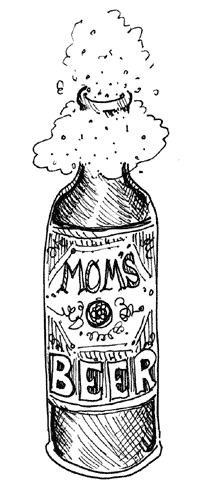Foggy bottle: That little cloud is just gas

DRAWING BY DEBORAH DERR McCLINTOCK
Q. Fizz-icists, what are a beer cloud, a Coke cloud, and a champagne cloud? –A.G. Candler
A. The wispy cloud in the neck of a just-opened cold bottle is essentially a little fog, with tiny particles of liquid water condensed out of the air by the cold temperature, says Robert L. Wolke in What Einstein Didn't Know. The cloud's whiteness is from the particles reflecting all wavelengths of light equally.
In a still-capped bottle, the space above the drink is filled with compressed carbon dioxide, air, and water vapor– all gases– with some molecules leaping up out of the liquid, some diving back down in again. Upon opening, the compressed gases rapidly expand out of the bottle, losing energy and cooling dramatically. "The gases are now cold enough to condense out some of the water, and that's the fog (cloud) you see."
Q. Is it really true that men look for good looks in women, while women look for power, status, and security in men? It's been said a thousand times, but is it so? –Melania Knauss
A. As researcher Steven Gangestad discovered in a cross-cultural survey, the more economic power women had, the more they were interested in physically attractive partners, just as men were, say Elliot Aronson, UVA's Timothy Wilson, and Robin Akert in Social Psychology. Generally around the world, women have less power, status, wealth, and other resources than men do. So where women need to rely on men to achieve economic security, they must consider this when choosing a husband.
Herein lies the framework for "equity theory," with female youth and beauty deemed a fair exchange for male career and economic success. But in the U.S. (or any similar culture) where women now have access to education, good-paying jobs, high-status occupations, etc., a survey of 1,000 young adults in the Northeast showed a breakdown of this traditional beauty-for-money exchange.
"People from wealthy families wanted a partner who was also wealthy, whether they were male or female. Similarly, men and women who were physically attractive wanted to find their match: a beautiful or handsome mate," the survey concluded.
Q. In an automobile accident, isn't it worse hitting another car head on than a tree or utility pole? –E. Knievel
A. Be careful here. Most people believe if you're going 35 mph and hit a car also going 35 mph, it would be roughly the same as driving into a tree at 70 mph. Sensible though that may seem, it just is not correct, says transportation analysis specialist Michael Bronzini in Scientific American.
What really matters when you get into an accident is how suddenly the car comes to a stop. With the tree, the stop is immediate–a rapid and disastrous deceleration, says Dick Smith of the University of West Florida. The two cars may stop each other virtually instantaneously, or they may not: If your car is heavier and going faster, you will overpower the other car, so to speak, and the two of you continue in the direction you were moving, though at a slower speed. This is better than hitting a tree, but not for the other driver!
The angle of impact also matters, as do cars' built-in "crumple zones" that absorb energy. As for power poles, these are fitted into slip bases that let them move out of the way.
In any case, wear a seat belt, and drive safely.
Q. At eight hours a night, most of us by age 60 have spent 20 years sleeping. So, what if we could cut this to an hour a night– in effect adding 18 years to our first 60? –R. V. Winkle
A. Bizarrely, there are people who do fine on little sleep, though they are rare, say Mark Rosenzweig et al. in Biological Psychology. Researcher William Dement told of a university prof who slept only 3-4 hours a night for more than 50 years, and lived to age 80.
After a long search, researcher Ray Meddis found a cheerful 70-year-old retired nurse who said she had slept little since childhood, and her stay in Meddis' sleep lab seemed to confirm this. The first two nights, she slept not a wink, saying it was all "so interesting to her." On the third night she slept 99 minutes, then averaged 67 minutes on subsequent nights, including brief dream periods.
She never complained about feeling drowsy during her 23-hour days. "During the night she sat on her bed reading or writing, and around 2am fell asleep for an hour or so, after which she readily awakened." Meddis found several other short sleepers, some of whom reported parents with similar patterns. So it's likely this is at least partly hereditary, and no time-thieving option for most of us.
Send Strange questions to brothers Bill and Rich at .
#